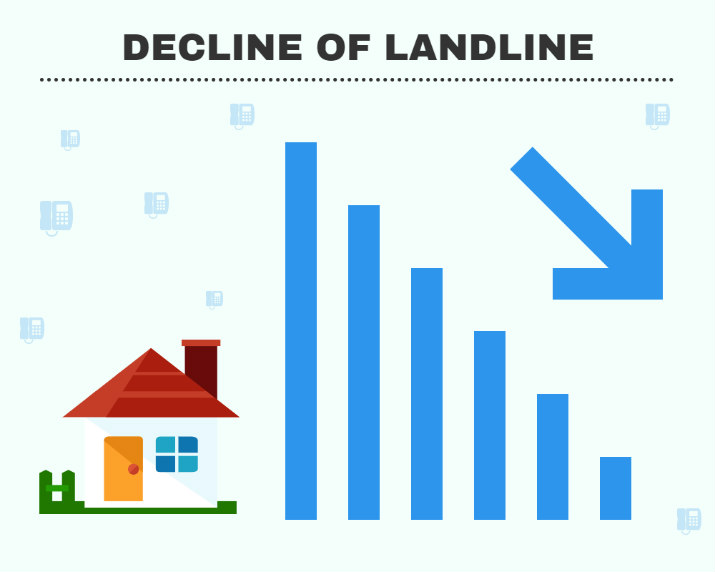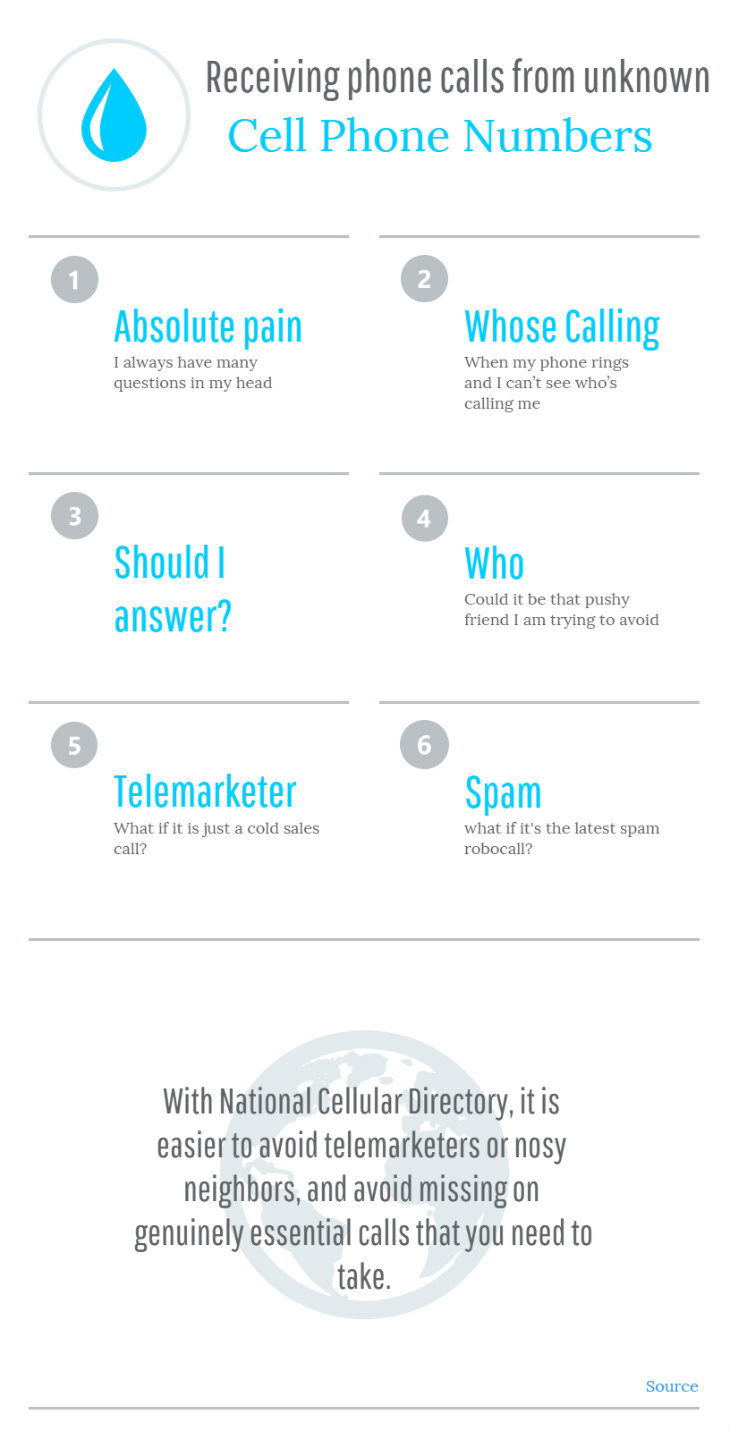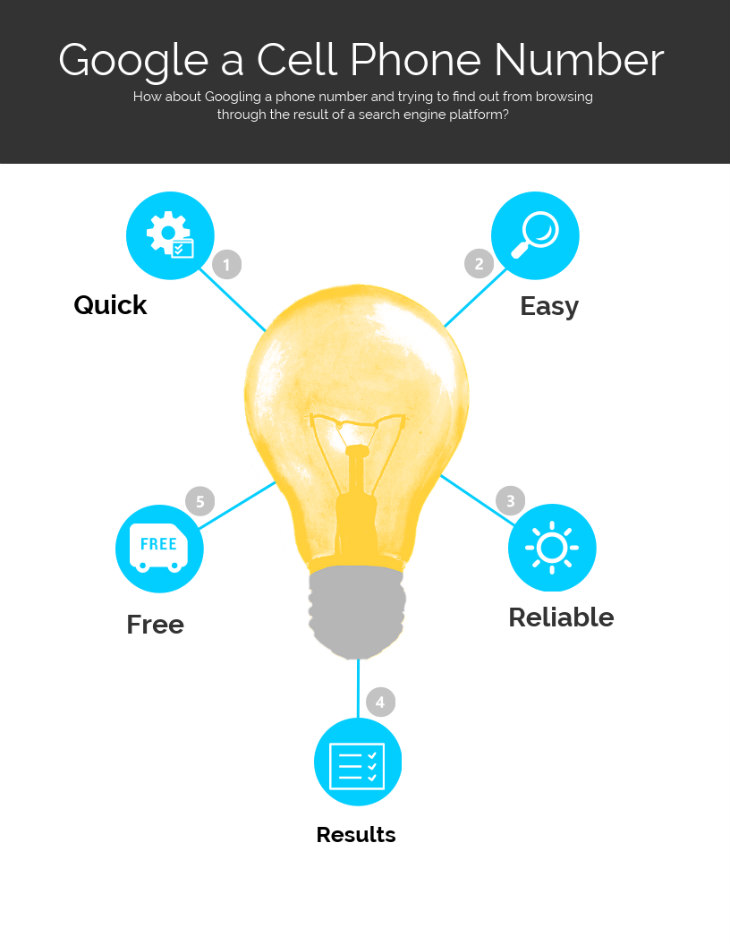As landlines are declining, there are new ways to discover the names of people who are calling you by using NCD, A.K.A the National Cellular Directory.
In this day and age, many homeowners are ditching their landlines in favor of their mobile phones. With the ability to remain continuously connected to the internet and swiftly communicate in many circumstances, landlines are quickly turning into a thing of the past.
Free Tip: How to find someone's cell phone number absolutely free!
The decline of landlines and the affirmation of cellphone-only homes.
To illustrate the decline of landlines and the affirmation of cell-phone-only families, I thought it would be a great idea to get started with my perspective, as I feel many readers will be able to relate to the following.
Personally, I have been living without a landline for the past ten years of my life, and so is the vast majority of my peers (I am 29 years old, living in one of the most populated metropolitan areas in the United States).
My parents, who live in a smaller town and have been enthusiastic supporters of landlines over mobile phones, are currently making the switch to get rid of their landline! They have come to realize that landlines were useless to stay in touch with their kids, as me and my brothers both use mobile devices and internet only.
Their landline was also pretty pointless to get in touch with relatives overseas (We have family in Australia, making it expensive to make landline calls).
Ultimately, most of the calls they receive on a daily basis come from sales reps and other unwanted organizations. Switching to a cellphone-only system was a no-brainer for my parents, it gave them peace of mind and saved them money in the process.
At the age of 29 going 30, I almost feel like a dinosaur myself. It doesn’t matter how hard I focus; I cannot remember the last time I’ve seen a person between 15 to 25 using a landline or even having a phone conversation that doesn’t involve an online service or a mobile phone.

According to the excellent statistics portal “Statista,” more than 90% of homeowners back in 2004 had a fully functional landline for their household.
Today, the number has dropped down exponentially. By 2017, the rate of landlines has fallen to a more 43.8%, showcasing a steady and consistent decline year after year.
Conversely, the number of “cell phone only” households or businesses is increasing, almost as a reverse mirror effect!
In 2004, the number of “cellphone-only” homes were only at 5.0%. Fast forward to 2017, and we have over 52.5% of people in America relying solely on mobile phones and Internet for their communication, without a working landline.
This trend isn’t only changing things in the United States, but indeed throughout the entire world.
According to the Telegraph, one of the leading newspapers in the United Kingdom, most people are starting to prefer using services such as Whatsapp, Facebook or Snapchat in other to communicate with people in their lives, rendering landlines pretty much only an avenue for salespersons to bother them with unwanted calls.
Just by observing people around me, it is quite easy to jump to the conclusion that landlines are out, and mobiles are all the way in!
How searching for a caller’s identity has become trickier.
It’s undeniable; landlines are a thing of the past, and mobile phones are here to stay. There is a wide variety of benefits with using cell phones over landlines, but finding the identity of callers is one of the few things that has gotten more complicated.
Back in the day, all you needed was a bulky old phone book. Those big volumes had almost every number, and they could easily be used to figure out the identity of most callers.
Learn more: about the cell phone directory transformation
However, there isn’t really such thing as a unified, comprehensive database for cellular phones. Today, big data is highly valued. Most companies (including cellphone service providers) don’t want to share their customer info, for fear of the competition snatching customers away from them! For this reason, looking up a number directly might not be as easy.
Enter cellular database platforms
While it was quite simple to figure out a number calling a landline by looking it up on the old school phone book, it is not as easy to gather information about a cell phone making a call to your number, since service providers are not very keen on exposing their customer data.
For this reason, digital cellular phone directories are gaining momentum, mining public data from social media networks, government websites, and other sources. Such platforms are an excellent way to gather information about callers and shine a light on the identity of whoever is looking for you by calling your mobile phone.
Are there other ways?
Sure, but they are not very effective and are costly, time-consuming, and potentially dangerous for the sake of protecting your personal information.
If you are seeking to find out more about the identity of people calling you, it is probably because you value the importance of your privacy. The last thing you might want is your search to bounce back in your face and actually expose you even more to unwanted attention!
It is indeed possible to use social media platforms such as Facebook, LinkedIn or Google Plus to find phone numbers, but the chances of succeeding are quite small since not many people are willing to post their full phone number for everyone to see.
In addition to that, many people forget to update new phones or changes in their contact details, meaning that a lot of contact information gathered from social media accounts can actually be outdated and inaccurate.
On the other hand, organizations such as National Cellular Director can gather and organize a massive amount of data, with access to a mind-boggling 10 billion records.
Feeling a little lost?
Not to worry - think of it as a digital phone book, which is always handy, and constantly updated with new contacts and information! It’s like your old phone book, only over a thousand times larger and more extensive.
Landlines or not, you’ll certainly agree with me when I say that receiving phone calls from unknown cell phone numbers is an absolute pain. When my phone rings and I can’t see who’s calling me, I always have many questions in my head. Should I answer? Could it be that pushy friend I am trying to avoid? What if it is just a cold sales call? What if it is important? Maybe the company I’ve interviewed for that job has a hidden number, or perhaps my kid ended up in the hospital, and their ID is not visible to the public…
In short, there is a sense of anxiety with receiving calls from an unknown cell phone number that could make you feel trapped in the limbo between answering and not answering. With tools such as NCD, you can overcome such situation and instantly gain a clear insight into who is actually calling you.

With National Cellular Directory, it is easier to avoid telemarketers or nosy neighbors, and avoid missing on genuinely essential calls that you need to take.
Better yet, they have a free Happy Hour.
While some methods to discover phone numbers are costly or require a lot of time, NCD offers a free solution: a reverse cell phone number lookup, which allows users (registered NCD members) to search for details about any other number featured within the expensive National Cellular Directory database.
The service also grants access to the premium database of the service during Happy Hour, which is a specific time (one hour a day) that allows people to search numbers for free, no strings attached.
This feature can be accessed seamlessly by creating a new account on NCD, joining the company on social media and simply get going with the search!
Other websites are offering reverse phone lookup services, which allow users to find the identity of callers from unknown numbers, as well as other details such as addresses, family members, and affiliated contacts.
However, most of the time these services are not offered for free. Different providers might have different pricing structures, such as offering one-off fees for each search or providing a given number of searches for a specific fee. Others might offer subscription-based deals, allowing users to pay a periodic fee for an unlimited number of searches within that specific time period.
Google a Cell Phone Number
How about Googling a phone number and trying to find out from browsing through the result of a search engine platform?

Sure, this is apparently an easy and quick way to look up a phone number, but the results are hardly credible and clear in most cases. You might be able to find the number you need, but there is a high chance you’ll run into spam-ridden websites.
Such platforms might claim to have the answer you are looking for but might expose your computer to risks, or your email address (or other personal information that might be required by some services) to further spam and annoyance. You could easily get from bad to worse by trusting a random website you Googled!
On the other hand, NCD offers the very same services at no charge whatsoever. Another great thing about relying on National Cellular Database for your searches is that you can cash in on the credibility of this platform.
There are hundreds, if not thousands of phone number database services online, and it is quite hard to know whether a platform is credible or not. Many companies just don’t live up to the expectation of consumers, and the database they can provide is not as extensive as what they advertise. Other company might charge a premium fee, and outsource their search to another database, which is probably not convenient for you, the end consumer.
As an industry leader with a continually growing database, National Cellular Directory has been around since 2005 - As you can imagine, that’s a long time, especially in such a fast-pace and shape-shifting industry like big data and digital databases.
There is indeed something to be said about a company who managed to stay relevant in the industry for some many years, and NCD is a name that’s trusted and respected by customers and industry insiders alike.
The company is currently home to one of the most exhaustive databases and people search services on the Internet. Besides the sheer size of NCD’s database, the company strives to offer the most up-to-date and accurate information possible: after all, a giant database is nothing, if the info is not accurate or recent!
The Bottomline
With National Cellular Directory, you will have a much better chance to find the identity of people calling you. In addition to that, you can rest assured you aren’t wasting your time on a shady platform with a poorly implemented database.
This service combines the trustworthiness of a business that has been around since 2005 with the integrity of a company always striving to provide the best, most updated cellular phone information on the world wide web today.